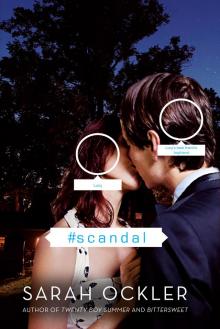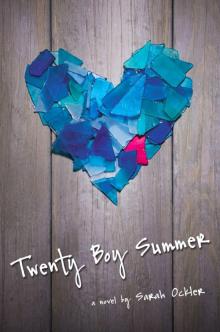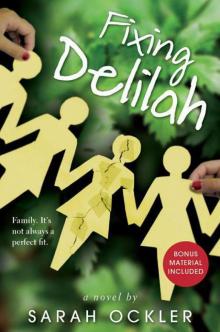- Home
- Sarah Ockler
Fixing Delilah Page 18
Fixing Delilah Read online
Page 18
“Okay,” Mom says, brushing the hair out of my eyes. “I’ll start.”
There’s a stray button on the floor. They must have missed it when they cleaned up the glass from the jar.
Did she buy the button on its own, or was it an extra from a new blouse?
“There were so many times I wanted to tell you about your father,” she says.
I wonder what happens to all those extra buttons that come with new clothes?
“But as you got older, I thought if you knew the truth, you’d look at me the way my mother did when she found out. I couldn’t bear that, Delilah. I never wanted to see that kind of hatred in your eyes.”
Maybe we should give them to Alice for her creature creations.
“Please say something, Del. Even if it’s something angry.”
I wonder how many loose buttons there are in this world, just rolling around in a jar without a mate or a blouse to go on. No destiny. No purpose. Just sitting there, unnoticed. Forgotten.
“Delilah, please?”
I look at my mother, deep lines in her forehead, no makeup to fill in the wrinkles around her eyes. I wasn’t prepared for it, and the immensity of my sadness wrings the anger out of me me until all of the harsh words escape like water squeezed from a sponge.
“I’m not mad that you were with Casey,” I say. “I’m mad that you lied to me. And that you kept on lying to me every time I asked you about Thomas Devlin. You never wanted to talk about my real father.”
She nods, pulling at the collar of her robe. “It killed me to pretend like that, but there was always some reason not to tell you.”
“Mom, I hate…” I hate you for being weak and needy and stupid. I hate you for making a mistake. I hate you for not being perfect. It’s what I want to say, but the thoughts evaporate almost as quickly as they appear. How can I fault her for trying to bury a truth that when exposed to air and sunlight could only hurt the ones she loves? For doing with the story of my father exactly what I’ve done with my own stories for so long? All the stories we’ve told each other were broken or incomplete, truths stretched thin and riddled with holes where the light shone through.
“I didn’t plan that night with Casey. You know that much, right?”
“I know,” I say. “I made a lot of mistakes, too. Especially with guys. I get that part of it.” I stare at the button on the floor again, bright white against the dark of the wood, wishing I could press it and open a hidden passageway into Red Falls Lake where I could breathe underwater and watch the sun blaze beneath the surface.
“Mistakes? Delilah Elizabeth Hannaford, the mistake I made was not telling you the truth. Casey was not a mistake. From the moment I learned I was pregnant, I’ve never regretted that night—not once—because at the end of it all, I got you.”
Mom kisses the top of my head and squeezes me closer, the rise and fall of her chest uneven as her arms tighten around me.
“But why did you take me away from here?” I ask. “Why did we stop coming? Why did we stop talking about them? Okay, Nana was upset. But did she really cut us off because of that one time between you and Stephanie’s boyfriend?”
My mother takes a deep breath and looks out the window, pulling a tissue from her bathrobe pocket.
“Your grandmother was a difficult woman. None of us was ever very close with her, but that was especially true with Steph. They never saw eye to eye on anything, and when Rachel and I got older and moved away, Steph was left here to deal with Mom on her own.
“After Stephanie died, Mom felt a lot of guilt about their relationship, and she resented me and Rachel for not being able to save her. ‘You were her sisters,’ she always said. ‘You would’ve noticed something was wrong, but you were too busy to bother with Red Falls.’
“Eventually we got past that part of it, but, Delilah, you have to realize what suicide—or any death with questionable circumstances—does to the people left behind. Not only do we grieve the one we lost, but there’s this whole new layer of guilt and accusation and fear. None of us could talk about her, because we all felt responsible for what happened. Why didn’t we know she wasn’t taking her medication properly? Where did she get sleeping pills? Why didn’t anyone notice? Did she take her own life, or was it truly an accident—the mistake of a depressed girl who just wanted to fall asleep that night? Even trying to talk to people outside the family, like Megan or any of her other friends, was impossible. Everyone wanted it to be someone else’s fault. We all needed someone to blame. Someone to scream at. Especially Casey. He didn’t leave town because of what happened between us. He left because he couldn’t face life here without her, the constant questions, never knowing if he or any of us could have made a difference before it was too late. He told us he would go, even before that night on the docks, and he did it.”
I shift on the bed, wrapping my arms around myself as an edge creeps back into Mom’s voice. She shakes her head and continues, the creases between her eyes deep and long.
“You know, when a person is murdered, you can miss that person and put all of your anger into hating the killer, even if you don’t know who the killer is. You also have the choice of forgiveness. But when someone takes her own life, she is the killer. So we missed our sister, and at the same time, when we thought about the possibility that her death was her own doing, we hated her for leaving us. God, it’s been almost twenty years, and some days I still pick up the phone, hoping she’ll be on the other end, wishing I could forgive her. I just can’t believe she really… it never goes away, Delilah. That feeling. It’s always with me.”
Mom presses the tissue to her eyes and I don’t say anything for a long time.
“I don’t know how much of this you remember,” Mom continues, “but sometimes on our summer visits, your grandmother would refuse to leave her room, sometimes for days on end. Or she’d go stay with a girlfriend across town until she felt like dealing with us again. She was not well, Delilah. Clinically. Like Stephanie.”
“I know,” I say. “I found the medications in her dresser drawer that night I was in her room.”
“Well, she’d been on them for decades—even before we lost Steph.”
“I guess that’s why I don’t have that many memories of her,” I say. “Seems like she didn’t want to be around much.”
“She loved you, Delilah. But she didn’t show it like Papa did. She couldn’t.”
Mom’s right; my grandfather adored me. Every time he’d sit me on his lap and race me around in his wheelchair, or read the comics to me, or laugh at my silly endless knock-knock jokes, I knew that I was the light of his life. I haven’t thought about him this summer as much as I’ve thought about Nana and Stephanie and all of the secrets, but when I do, I miss him all over again, like I just got the news this morning. It’s as if he’d been part of our lives all along, and now the doctors called to tell us there wasn’t anything they could do.
“After my father died,” Mom says, “I was overcome with grief and shame. I had to talk to someone. I had to confess the secret I’d been carrying since that night with Casey. So I told Rachel. I knew she’d be upset about what happened, and hurt that I’d never told her. I knew it would change things between us. But I also knew she wouldn’t turn her back on me… or on you.
“My mother overheard the entire conversation. She snapped. She said horrible, hateful things to me and even to Rachel, whose only crime was to hear my confession.”
“What things?” I ask.
Mom closes her mouth to hold back the words like a dam. “Remember that she wasn’t herself, Delilah.”
“But I—”
“It’s not important anymore. She’s dead.”
“It’s important to me, Mom. I need to know. Please stop trying to protect me from my own history.”
Mom takes my hand and closes her eyes, nodding slowly. “After my mother found out that Casey was your father, she accused me of robbing you from Stephanie. She said that Casey and Steph would’ve been marr
ied one day, and that you should have been theirs. She screamed at Rachel and me on the day we were supposed to bury my father. Shouted it through the whole house. That when God took Stephanie, he took the wrong child. That he should have taken one of us. That we weren’t good enough to save Steph, and for that we didn’t deserve to live.”
Mom’s face takes on an intensity that I don’t recognize; a pain I’ve never before seen in her eyes despite the long and troubled story of us. It makes me want to take her away from all of it, to become the mother just this once, to rock her until it’s okay again. All the times I hated Claire Hannaford Speaking, smile-as-you-dial, the constant buzzing of mobile communications devices, I’d give anything now for a call from her assistant. To see my mother clear her throat and shake it off and answer that phone, large and in charge.
“God, Mom, I’m so sorry.” I rest my head on her shoulder and squeeze her hand, all of the comforting, right words lost.
“There’s more,” Mom says, steadying herself with a deep breath. “Delilah, Rachel and I stood in the living room of this house, in this home where we’d spent our entire young lives together, and we heard my mother make a promise to God that if after all of her praying and sacrificing he still didn’t take us, she would spend the rest of her life begging him to take you instead, just… just so I could know the pain of burying a daughter. After all the fights in our past, the days she’d go without speaking, the cruel words for which her illness was always a ready excuse—that promise was it. That’s why we left. It didn’t matter if it was the depression talking or the shock of hearing about Casey and me or the loss of her husband or anger and guilt about Stephanie or the medications… her words were enough. Rachel and I couldn’t bear to be near her after that. By the time some of our anger had subsided, months turned into years, life went on, and we just never came back. And now, she’s gone.”
I replay my grandmother’s words in my mind only once, trying instead to think about the orange pill bottles. Trying to remind myself that through the burden of her depression, Nana had also suffered the deaths of her young daughter and husband and had just learned that I was the child of her dead daughter’s boyfriend who’d since vanished from their lives. Deep down, she probably blamed herself for Stephanie’s illness and her eventual death. And I believe she loved me once. Maybe she always did. It doesn’t lessen the scorch of her jagged, vengeful vow, but it helps me understand things just a little more.
When I’m all out of questions, Mom picks up the pink jewel box sitting in the windowsill—the one I bought from the first estate sale.
“What’s this?” she asks. “Was it hers?”
“I think so. Something told me to keep it when I saw it with the other sale stuff. I don’t know where—”
But I do know where. It’s here now, the memory materializing before me like the moose in the morning fog.
“It’s my box of tears,” Nana said. “Whenever I’m feeling sad, I open it up and cry, cry, cry till I can’t anymore.”
“Can I cry in the box, too?”
“Of course. Just come in here and get the box, hold it in your hand, and think about why you’re sad. It holds all of our sadness, so we don’t have to do it alone.”
“Won’t it overflow?” I asked. “From all of the tears?”
“No, Delilah. This is a magic box. There’s room for lots and lots.”
“Are you sad right now?”
“Yes. But I’m happy, too. I’m happy that you’re here. You and your mom and Aunt Rachel…”
“I don’t know,” I say again, but I do know, and it’s a real memory, one that’s mine and my grandmother’s alone. “It just reminds me of her—the good things about her.”
“It’s beautiful.” Mom runs her finger over the velvet inside, then closes the lid. She looks at me for a moment as she returns the box to the sill, still trying to get comfortable with the silence that sometimes falls between us.
“I love you, Honeybee,” she says. She smiles and squeezes my shoulder, rising from the bed and walking out the door, the tail of her Chanel robe billowing out behind her like fog through the trees.
Chapter thirty-one
I stand on the high bank of Point Grace with Mom and Aunt Rachel, shoulder to shoulder, our backs to the water at the deepest end of Red Falls Lake. The three of us face a sea of faces sailing in the black ships of their mourning clothes, all here to remember Elizabeth Rose Hannaford. Among them, Jack is here, and Luna and Megan, and people I remember from the estate sales, like Alice with her dog hair purse. The coffee cake people, too—all of them here to share the burden of this loss and seek comfort together.
Patrick, though, is not with his father. The weight of his absence presses noiselessly on my heart with the sadness of losing my grandparents and the aunt I never knew, gone to death and depression, to silence and old wounds. With each passing day, hope that Patrick and I will ever again meet under the bleachers fades. But like the memories of my grandmother, nothing is ever all bad. In the aftermath of our end, I’m trying to think about the good things—his familiar smile that first day after our long summers apart. Eating maple drizzlers at the Sugarbush Festival. The fireworks show under the willow and the songs he sang and the kissing… still, it’s all too close to become a memory, so I hold on, not ready to let it slip away.
Through the smoke of the sage bowls Rachel lit beneath the table holding the rose-etched urn, my mother reads an old poem about all of the unsaid things that pass between the living and the dead. Lost in the cadence of her voice, I don’t follow the verse as much as the imagery, thinking about the intersections of our lives in Red Falls—lives that only three months ago had been separate. After all the years of hurt and silence, however late in the season of our relationships, my grandmother brought us back together.
“It was my mother’s wish that part of her be scattered over Red Falls Lake,” Mom says, dabbing her eyes with a tissue. “She will also be buried in Forest Lawn Cemetery next to our father, Benjamin, and our sister, Stephanie.” She and Rachel remove the urn from its pedestal and carry it together to the edge of the bank. Rachel holds the lid while Mom shakes some of the remains into the air over the water.
Remains. As the gray dust swirls and floats down to the lake like falling stars, I look at my family and the people of Red Falls, all of us crying and smiling and remembering and thinking about the same person, and I realize that remains is the wrong word. The ashes of a body are just that—ashes. The dust of our bones. What remains are the people she left behind. The wake of history and love, however confusing and imperfect, she left for her family. When I think of Elizabeth Rose Hannaford, I won’t remember the ashes over Red Falls Lake, or the pill bottles, or the cruel words she spat at my mother eight years ago. I’ll remember her life—the good things. The happy stories from the people in Red Falls who knew her later, when she was finally able to crawl partway out from under the dark cloud of her depression and enjoy her days here.
Elizabeth Rose Hannaford, the mother. The grandmother. The trunk of the family tree from which we all branch and flower.
As we begin our quiet march down the hill to the cars that will ferry us to the cemetery, I look behind me at the old weeping willow—our fireworks willow. Beside its tangled leaves, Patrick is there, his suit dark, his hands folded peacefully in front of him as we file past. I look for him again when we reach the cars, but he’s gone.
The cemetery service is shorter and smaller, only her closest friends and us, only those who know the meaning of the inscription on the headstone: Elizabeth Rose “Ollie” Hannaford. Patrick is again in the background. He doesn’t approach.
After the final words when Mom closes her book of poetry and the remaining mourners leave white roses on top of the urn, I ask for a few minutes alone with my grandmother and Ollie.
I reach into my pocket and pull out the pink box of tears, following Nana’s instructions. I open the lid, run my finger along the velvet, and give over all of my sadness, tuc
king the box into the pile of flowers.
“So you don’t have to do it alone,” I whisper, still hoping for the sign I sought in her bedroom that night, reading her books and trying on her costume jewelry. I wait, eyes closed, eyes open, but nothing happens. The rain doesn’t fall from the gray sky. The trees don’t shake. Neither does the wind blow nor the ground split open to wake the dead from their eternal slumber.
But she heard me. I know she did.
“Delilah?”
As I turn from my grandmother’s grave, I see the girl approaching. Shame burns my face.
“Emily! I—I’m… I didn’t… thank you for coming.”
Em shakes her head and throws her arms around me, pulling me close against her dark green dress. “I am so, so sorry about your grandmother, Delilah. And for everything your family went through. I didn’t know Liz well, but she was close with Luna. She came in for coffee sometimes, and I’d give her the day-old pastries to take home for Ollie. He liked the cranberry-orange scones best.”
I smile, picturing a big sloppy Saint Bernard eating scones with his pinky up.
“Thanks, Em. I’m glad you’re here. I wanted to talk to you after everything that—”
“No. You listen to me first. I know this isn’t the best place for it, but I have something to say.” Emily pulls away, keeping her hands firm on my arms. There’s a fire behind her bright blue eyes and I know that whatever comes from her mouth next, she means it. I look at her and wait for the angry words I so deserve.
“You know what your problem is, Delilah Hannaford?” Em stares right inside me. “You refuse to see what’s in front of your face. It’s easier for you to invent reasons not to like me than to accept that someone might actually want to be your friend.
“The first time I met you, I knew there was something real about you. Way more than what was on the surface—that was obvious. I trusted you. You were nothing like the other girls that come through here all summer chasing after Patrick. He knew it, too. The three of us had so much fun together. You never got jealous or weird about my friendship with him until that day in his house. Which was so crazy, because Patrick and I are practically siblings—that’s the way I love him. I love you both that way. But you totally turned on me.”

 Bittersweet
Bittersweet The Summer of Chasing Mermaids
The Summer of Chasing Mermaids #Scandal
#Scandal Twenty Boy Summer
Twenty Boy Summer Fixing Delilah
Fixing Delilah